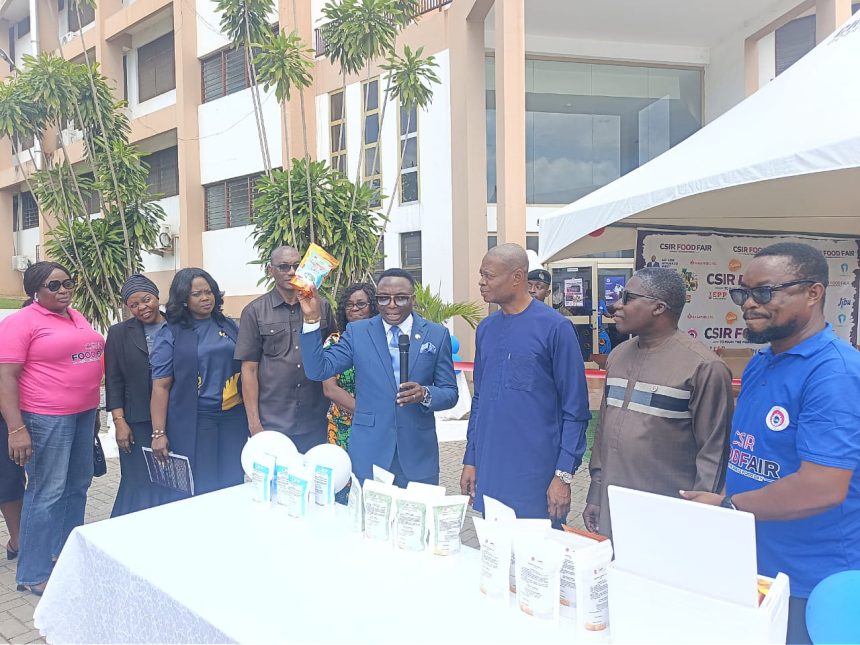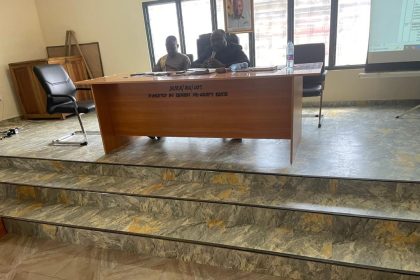The Council for Scientific and Industrial Research – Food Research Institute (CSIR-FRI) has officially unveiled its 2025 Food Fair in Accra, showcasing a suite of cutting-edge food technologies and sustainable innovations that align with Ghana’s agricultural policy priorities.
The three-day event, held on the theme “Right to Food for a Better Life and a Better Future,” brought together researchers, students, policymakers, and industry stakeholders to explore science-led solutions for food security and agribusiness development.
Exhibits highlighted advancements in food safety systems, climate-resilient processing technologies, and value addition to indigenous crops; all aimed at reducing post-harvest losses and enhancing national food security.
Dr. Charles Tortoe, Director of CSIR-FRI, emphasized the institute’s commitment to bridging the gap between research and commercialization.
“Our objective is to translate scientific findings into practical innovations that support national industrialization,” he said.
He noted that CSIR-FRI’s research focus was directly aligned with Feed Ghana Programme and the National Agribusiness Policy, both launched in 2025 under President John Dramani Mahama’s administration.
“Our focus commodities: rice, maize, soybeans, vegetables, and livestock, feed directly into the national agenda,” he added.
“We’ve developed 32 training modules to support agribusiness and are actively empowering women entrepreneurs through targeted programmes.”
Visitors engaged with product prototypes including fortified flours, cassava-based snacks, and shelf-stable convenience foods developed for both local consumption and export. The institute also showcased digital traceability tools to improve transparency in food supply chains.
Alhaji Yusif Sulemana, Deputy Minister for Lands and Natural Resources, representing the Minister for Environment, Science, Technology and Innovation, commended CSIR-FRI for its contributions to national development.
“Food is the foundation of life,” he said. “It nurtures our health, strengthens our societies, and fuels national development. The right to food is not a privilege, it is a fundamental human right.”
He reaffirmed government’s commitment to food security, citing key interventions such as the Feed Ghana Programme, the Palm Oil Industry Policy, and the Nkoko Nketekete Poultry Industry Revitalisation Programme.
“These policies aim to modernize agriculture, reduce food import bills, and create sustainable jobs,” Alhaji Sulemana said. “We are positioning Ghana as a key player in the global palm oil market while strengthening domestic poultry production.”
The fair called for renewed efforts to integrate science and technology into Ghana’s food system modernization agenda.
“We must envision a Ghana where every citizen enjoys the right to safe, nutritious food,” Alhaji Sulemana said. “This vision is already taking shape through the policies and initiatives led by President Mahama’s government.”
Prof. Paul Pinnock Bosu, Director-General of CSIR, urged a cultural shift in how Ghanaians treat food.
“Many of us throw away valuable food materials like ‘kelewele’ and ‘amane’, thinking they’re insignificant,” he said. “But food must be cultivated, managed, and preserved. If we don’t, we’ll face scarcity.”
He stressed the role of scientific inquiry in food production, saying: “There are many mouths to feed and many stomachs to fill. That’s where we in the scientific community come in.”
“Since independence, CSIR has applied scientific methods to develop technologies across the agricultural value chain.”
Prof. Bosu also warned of the impact of climate change on food systems, stating that “If we don’t keep up with what nature is doing, we may have food but not the means to feed ourselves. Food is as fundamental as our right to life, health, and decent living.”
The fair drew participation from several organisations including the Ghana Standards Authority, Food and Drugs Authority, and KOPIA Ghana as well as students from senior high schools.
Sponsors delivered goodwill messages ahead of the launch of newly registered FRI food products, while awards were presented to winners of the quiz and cooking competitions.
CSIR-FRI was widely commended for aligning its research with Ghana’s agricultural policy priorities, with calls for stronger collaboration among research institutions, private sector stakeholders, and government agencies.
GNA





